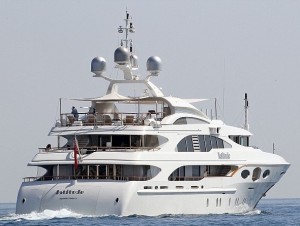Thanks largely to the Laffer Curve, there are some impressive examples of failed tax increases in countries such as the United States, France, and the United Kingdom. But if there was a prize for the people who most vociferously resist turning over more of their income to government, the Italians would be the odds-on favorite to win.
When they’re not firebombing tax offices to show their displeasure, they’re taking to the high seas to escape.
Here are some excerpts from a report in the UK-based Telegraph about runaway yachts.
Thousands are weighing anchor and fleeing with their gin palaces to quiet corners of the Mediterranean to escape a tax evasion crackdown – part of efforts by the government of Mario Monti, the prime minister, to tackle Italy’s €1.9 trillion public debt. …in the ports and marinas they are going after the owners of luxury yachts. Uniformed officers of the Guardia di Finanza, or tax police, are performing on-the-spot checks, boarding boats and checking owners’ details against their tax records. …The unwelcome attention has led many yacht owners to flee Italy’s marinas for friendlier foreign ports, from Corsica and the Cote d’Azur in the west to Croatia, Slovenia, Montenegro and Greece in the east. Others are heading southwards, to Malta and Tunisia – where they can access their boats on low-cost budget flights from Italy for a fraction of the tax bill they might otherwise face.
Not surprisingly, a lot of middle-class people are suffering because of lost business.
Around 30,000 yachts have fled Italy this year, costing €200 million in lost revenue from mooring fees, port services and fuel sales, according to Assomarinas, the Italian Association of Marinas. “We’ve lost 10 to 15 per cent of our regular customers,” said Roberto Perocchio, the president of Assomarinas. “This is the worst crisis in Italian boating history. The authorities are using scare tactics and creating a climate of fear.” …Plans for a further 30,000 new berths have been put on hold. Business is down by more than a third in many marinas, with some half empty compared to last summer. “We’ve lost 40 boats in the last few months, all between 20 and 25 metres long,” said Giovanni Sorci, director of a marina at Rimini, on the Adriatic coast. “Most went to Slovenia – in fact it is so popular that there’s now barely a berth to be had there. …At Porto Rotondo in Sardinia, Giacomo Pileri, the general manager of a 700-berth marina, said at least 150 boats had fled to nearby Corsica. …A steep new tax of up to €700 per day on the largest yachts mooring in Italian ports, introduced by the Monti government in December, was watered down in March to exclude foreign-owned boats. But it has further fuelled the exodus of Italian boats abroad.
And it’s not just yachts that are being targeted by a revenue-hungry government. Here’s a remarkable report from Reuters on what’s happened to the luxury car market (h/t: suyts space).
Italians spooked by rising car taxes and highly publicized tax fraud spot checks cut back their purchases of Fiat’s high-end sports car brands Ferrari and Maserati in the first quarter of 2012, an industry body said on Tuesday. Ferrari sales slumped 51.5 percent, in Italy, and Maserati sales plummeted by 70 percent, said Italian car dealers group Federauto in a statement. Prime Minister Mario Monti’s government has stepped up its fight on tax evasion with spot checks on supercar drivers, as well as higher taxes on large cars. “These figures show how the choices made by the government are literally terrorizing potential clients,” said Federauto chairman Filippo Pavan Bernacchi.
I assume those awful sales numbers are partly because the economy is weak, but well-to-do Italians obviously don’t want to attract attention from the tax police.
The moral of the story is that Italy’s government should try a new strategy. The politicians need to understand that taxpayers don’t meekly acquiesce, like lambs in a slaughterhouse.
- When tax rates increase, sometimes people engage in tax avoidance, lowering their tax liabilities legally.
- When tax rates change, sometimes people choose to alter their levels of work, saving, and investment.
- And when tax rates go up, sometimes people resort to illegal steps to protect themselves from the tax authority.
Heck, even the folks at the International Monetary Fund (a crowd not known for rabid free-market sympathies) have acknowledged that excessive taxation is the leading cause of the shadow economy.
So rather than trying to squeeze more blood from an unwilling stone, maybe the Italian government should junk the current tax code and adopt a simple and fair flat tax.
To conclude, here’s Part II of the three-part video series on the Laffer Curve, which focuses on historical evidence (including what happened to the yacht market in the U.S. when politicians went after the “rich”).
Sort of makes you wonder why politicians never seem to learn from their mistakes – especially when thoughtful people like me give them free lessons about the relationship between tax rates, tax revenue, and taxable income.

